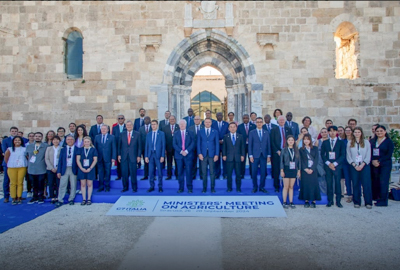Campus News
Professor Stacy Philpott leads U.S. delegates for “Agri-Young Hackathon” at G7 Ministers’ Meeting on Agriculture
Environmental Studies Professor Stacy Philpott led the U.S. delegation for a youth hackathon at the recent G7 Ministers’ Meeting on Agriculture in Italy. Philpott was asked by USDA representatives to coordinate and support the country’s team, a reflection of her national leadership role in preparing the next generation of agriculture professionals.



Environmental Studies Professor Stacy Philpott—who is the Ruth & Alfred Heller Endowed Chair in Agroecology, Center for Agroecology faculty director, and Agriculture Experiment Station executive associate dean for UC Santa Cruz—led the U.S. delegation to the “Agri-Young Hackathon,” at the G7 Ministers’ Meeting on Agriculture in Syracuse, Italy, from Sept. 26-28.
G7, or the Group of Seven, is a forum composed of representatives from Italy, Canada, France, Germany, Japan, the United Kingdom, the European Union, and the United States. The G7 Ministers’ Meeting on Agriculture focuses on collaborative efforts to ensure the resilience and sustainability of agricultural and food systems. The hackathon associated with this year’s meeting gathered students and teachers from agricultural schools and young farmers representing the G7 countries to propose solutions for pressing global issues.
In addition to Philpott, the U.S. delegation to the hackathon included university students Crystal Salazar-Nieto (California State University, Monterey Bay), Kennedy Bentley (Tennessee State University), and Steffan Kinley (Northwest Indian College). Philpott was asked by USDA representatives to coordinate and support the country’s team, a reflection of her national leadership role in preparing the next generation of agriculture professionals.
In advance of the hackathon, the U.S. delegation traveled to Washington, D.C., for a briefing with U.S. Department of Agriculture (USDA) representatives, including Director of the USDA National Institute of Food and Agriculture (NIFA) Dr. Manjit Misra, National Program Leader at USDA NIFA Dr. Carlos Ortiz, who visited campus in September 2023, and several other staff leading programs in climate change, nutrition and health, trade, and aquaculture.
After arriving in Italy, the U.S. delegation met with U.S. Secretary of Agriculture Tom Vilsack and his wife, Christie Vilsack, a literacy advocate and politician, to discuss the delegation members’ backgrounds and U.S. agricultural policy.
The full international group of hackathon delegates met several times to discuss and draft policy recommendations regarding three topics: the roles of science and innovation for agrifood systems transformation under climate change, the young generations in agriculture in the Global South, and global food security challenges and their drivers.
On Sept. 28, the delegates presented their conclusions and recommendations to the G7 ministers of agriculture, ministers of agriculture from 18 different African countries, the head of the World Food Program, the Food and Agriculture Organization, a lead representative from the Organisation for Economic Cooperation and Development, and the Consultative Group on International Agricultural Research.
The delegates’ policy recommendations to the ministers of agriculture focused on possible solutions for closing the gap between available innovations and their adoption at the farm and food system level, the importance of education and financing to support young farmers’ success, prioritizing water security management to upgrade outdated infrastructure and ensure water safety standards, and the creation of a G7 Youth Advisory Council, which would be a formal network of young farmers and researchers who annually take part in the G7 Agriculture Ministers summit.
“It was inspiring to work with young farmers and scholars from the U.S. and the other G7 countries, to hear discussion of agroecology, sustainability, and agricultural education on the global stage, and to hear ministers from the G7 and African nations taking note of the valuable role that youth—especially young women—have to play in shaping the future of our agricultural and food systems,” Philpott said of the experience.